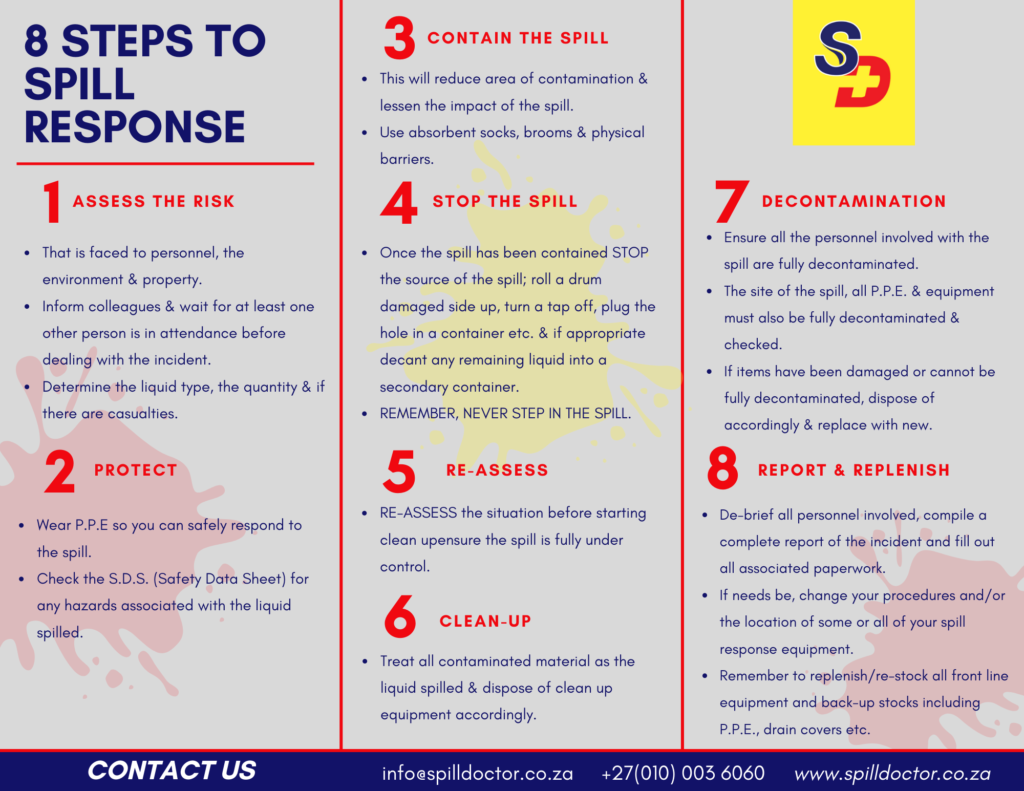Why should you report the spill?

Welcome to our guide on reporting spills! Spills can occur in various industries and can have significant environmental and health impacts. In this article, we will explore why it is essential to report spills, the environmental and health risks they pose, the legal obligations surrounding spill reporting, and how to report a spill. We will also provide best practices for preventing spills and share case studies highlighting the consequences of not reporting spills.
Why Report Spills?
Reporting spills is crucial for several reasons. Firstly, it allows for a prompt response to contain and mitigate the spill's effects, minimizing harm to the environment and nearby communities. Additionally, reporting spills helps in assessing the extent of the damage and developing appropriate strategies for cleanup and restoration. It also enables authorities to identify trends, implement preventive measures, and hold responsible parties accountable.
The Environmental Impact of Spills
Spills can have severe environmental consequences. They can contaminate water bodies, soil, and air, causing harm to aquatic life, plants, and wildlife. The release of hazardous substances can lead to long-term damage to ecosystems and disrupt the balance of delicate habitats. Proper reporting of spills ensures that necessary actions are taken to protect and restore the environment.
The Health and Safety Risks
Spills pose significant health and safety risks to both humans and animals. Exposure to toxic chemicals and substances released during spills can lead to acute and chronic health issues, including respiratory problems, skin irritation, and even life-threatening conditions. Reporting spills promptly helps in implementing measures to safeguard public health and prevent further harm.
Legal Obligations to Report Spills
Many jurisdictions have specific laws and regulations in place that require the reporting of spills. Failure to report spills can result in legal consequences, including fines and penalties. By fulfilling your legal obligations, you contribute to the overall enforcement of environmental protection laws and ensure that responsible parties are held accountable for their actions.
How to Report a Spill
If you witness or suspect a spill, it is crucial to report it immediately. The reporting process may vary depending on your location and the type of spill. In general, you should contact the appropriate authorities, such as local environmental agencies, emergency response teams, or designated hotlines. They will guide you through the necessary steps and provide you with the required information to report the spill effectively.
Preventing Spills: Best Practices
While reporting spills is essential, it is equally important to prevent them from happening in the first place. Implementing best practices and robust preventive measures can significantly reduce the likelihood of spills occurring. These practices may include proper training of personnel, regular equipment maintenance, adequate storage and handling procedures, and the use of appropriate safety protocols. By implementing these practices, you contribute to a safer and more sustainable working environment.
Case Studies: Consequences of Not Reporting Spills
Real-life examples demonstrate the severe consequences of not reporting spills. These case studies highlight the long-lasting environmental and health impacts that occur when spills go unreported. By studying these cases, we can understand the importance of timely reporting and the need for proactive measures to prevent similar incidents in the future.
Conclusion
Reporting spills is a crucial responsibility that helps protect the environment, communities, and public health. By promptly reporting spills, we can minimize their impact, ensure necessary actions are taken, and prevent future occurrences. Remember, it is not only a legal obligation but also an ethical duty to report spills and contribute to a cleaner and safer world.
Frequently Asked Questions
Q1: What is considered a spill?
A spill refers to the accidental or intentional release of substances, such as chemicals, oils, or hazardous materials, into the environment, posing a risk to human health and the ecosystem.
Q2: Who should I report a spill to?
The appropriate authorities to report a spill may vary depending on your location. Contact your local environmental agencies, emergency response teams, or designated hotlines to report spills.
Q3: Are there any penalties for not reporting a spill?
Yes, many jurisdictions impose penalties, including fines and legal consequences, for failing to report spills. It is important to comply with the applicable laws and regulations.
Q4: How can I prevent spills from happening?
Preventing spills involves implementing best practices such as proper training, regular maintenance, safe storage and handling procedures, and adherence to safety protocols. These measures significantly reduce the risk of spills occurring.

Leave a Reply